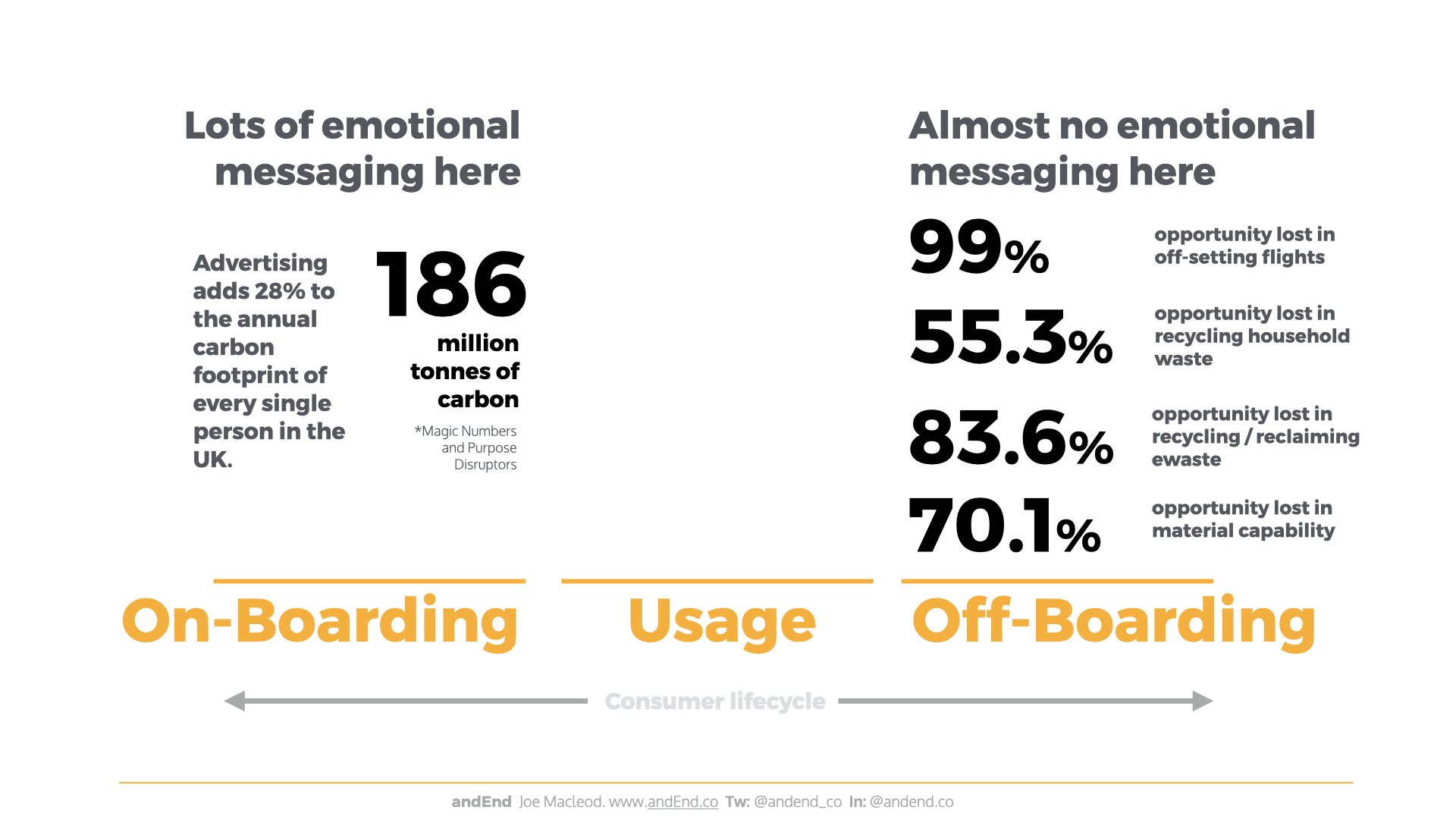

After death deletion.
One of the very early starting points of my journey on the endings road was hearing a story from a friend about the impossibility of leaving a service when a person dies.

LOST OPPORTUNITY at the end.
Advertising adds the emotional encouragement that makes us want to purchase at the beginning of the consumer lifecycle. And consequentially impact the environment. Can we use this same argument to measure the lack of emotional engagement at the end of the consumer lifecycle to show the missed opportunity?

A massive example of a lingering ending - ewaste in your home.
Engagement with consumers at the end helps in off-boarding old products people are hoarding, or don’t know how to dispose of. One of the largest growth sectors in US real estate is off-site storage. E-waste – old phones, TVs, computers, etc - is becoming a significant part of this pile of old products. These linger around in our homes, filling up cupboards without the benefit of instructions or destination for disposal. In the US only 17.4 per cent of 2019’s e-waste was collected and recycled. These were recoverable materials, valued conservatively at US $57 billion.

What is an account, when it isn't? Apple’s Account Deletion Requirements
The first rule of deletion, is don’t talk about deletion. Or provide a route to do it. Especially in a convenient and transparent way. This tech culture anomaly might be ending with Apple’s new guidelines. Well they were new in January, but had to be put back to June because lots of people were surprised that they had to create an ending to their product. Doh!

Returns are good at the end.
Returns are good. They prove that the consumer system can return directly to sender and not become societies problem.

Hinge, "Designed to be Deleted"
In contrast the lack of a clear deletion route of some apps, Hinge is excited the consumer might delete its app. What a great way to celebrate purposeful, task orientation of an app by measuring it’s success by the end of the product relationship. This approach now runs throughout the communication output of the company.

When should cookie consent end?
When should cookie consent end?
After every visit? After a day? A week? A year? A lifetime? A 100 years? A 1000 years? Longer? Surely not! I was really surprised…

Promise Forever Ends.
One of the funniest and disturbingly delusional denials of an ending is the lifetime promise - a guarantee for life or a promise that something will always be free. Businesses seem worryingly comfortable making this enormous commitment. Using it flippantly despite all manner of evidence against remotely achieving it.

Scope 3 Emissions. Emotional partnerships to the very end.
Passive measuring is at best informative. It will go some way to improving business activity, but it will fail to achieve the deep behaviour shift we need to challenge climate change. The producer - consumer relationship needs to aspire to more. It needs bonding throughout an emotional consumer lifecycle. That achieves change and concludes the product end-of-life with producer - consumer collaboration. Scope 3 is a start for businesses to consider emotional consumer endings.

GDPR...aargh! Right to be Forgotten #3
This article looks at the context of GDPR and creating consumer off-boarding experiences. In previous articles I have considered other areas of the off-boarding experience - Data mobility and Consent removal. This time its the Right to be Forgotten.

GDPR and Ends. An overview
Amongst GDPR protective intent is a wealth of endings. It requires, expects and encourages endings to happen for consumer data. How this happens though is to be designed and delivered by service providers. Yet many providers care little about this aspect of the consumer lifecycle and overlook its importance to the brand and long term perception of a company.

#WorstEndingEver? Maybe
Has Cambridge Analytica exposed Facebook to a metaphorical revenge porn experience? With no way to regain assets outside of their boundaries; drawing a parallel with thousands of victims around the world who have lost control of data, though a system that endlessly tells us to share, and fails to create ends.
